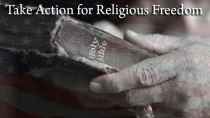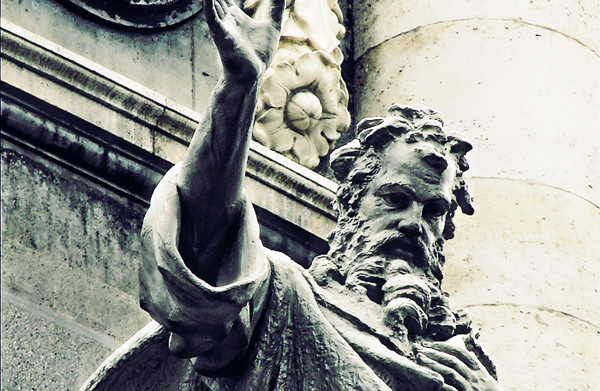
I do not hold myself out as any kind of sage, and certainly no scholar of law.
But I can honestly claim to have had at least one conversation per day, for the past twelve years, on the subject of marriage. Not marriage as a theory or concept, but marriage as a practical fact, as in: “Father, I want to get married.” “I want to be married.”
That’s because, for twelve years, I have happily served as an officer of marriage. As an officer of marriage, I must look at marriage in one particular way: as a binding contract, publicly made.
The marriage covenant binds spouses in this special way: You renounce the option of having sex with anyone else for as long as the person lives. The contract is: I will have sex with you, and only with you, until death.
 An officer of marriage therefore has one primary obligation. He must assure himself that both parties who propose to marry each other are, in fact, free to do so. As the suffering of poor Hagar shows us, bigamy doesn’t work.
An officer of marriage therefore has one primary obligation. He must assure himself that both parties who propose to marry each other are, in fact, free to do so. As the suffering of poor Hagar shows us, bigamy doesn’t work.
Simple enough, it would seem.
But: of the thousands of conversations about marriage that I have had, a good 85% of them involve doubts about this.
“But, Father, she has a divorce from the courthouse in Guilford County, North Carolina.” “Father, my first marriage was before a Justice of the Peace in Hawaii.” “Father, I’ve never been married before.” “And your fiancée?” “Well, she’s been married five times. But she’s not Catholic.”
A big mess. And at the heart of the matter lies the question of jurisdiction. Who has the authority to officiate a marriage?
Holy Mother Church has never conceded to any other authority the power to legislate how marriages begin or end. But we officers of marriage have to deal with the endless mess that has been created by other authorities claiming to do so, a mess that burdens and confuses people who want to act in good faith, people who really want to get married and enter into the binding contract in an honest way.
No one has authority over how marriages begin and end, other than God. The idea that any other authority can govern marriage: this is what has produced all the painfully impractical situations that burden so many people. One of the things that I have heard people say lately is that the Catholic Church needs to get out of the civil marriage business and deal with marriage solely “as a sacrament.”
But, as an officer of marriage, I can say that that will not work. An officer of marriage must, out of justice, always give the benefit of the doubt to a marital contract that has been publicly declared. Otherwise you risk, as an official, being a party to the crime of bigamy. If someone, who wants to marry, got married before, to someone else, no matter what the circumstances, I have to presume that the person is not free to marry now.
So the idea of the Church getting out of the civil marriage business is exactly backwards. It’s the state that needs to get out of the business of declaring marriages valid or invalid.
 Secular governments have produced the mess we now have, by granting divorces. The Church has not produced the mess. The Church’s laws are clear and commonsensical compared to the unmanageable and almost-always-unfair labyrinth of secular divorce law.
Secular governments have produced the mess we now have, by granting divorces. The Church has not produced the mess. The Church’s laws are clear and commonsensical compared to the unmanageable and almost-always-unfair labyrinth of secular divorce law.
Like I said, I make no claims to special legal knowledge. I appeal only to my practical experience as an officer of marriage who likes to help people get to a stable situation in life.
From the point-of-view of a practicing officer of marriage, I just want to say this: The decisions rendered by the Supreme Court, which were announced yesterday, are impractical. Impractical to the point of being genuinely ridiculous.
For about a century and a half, the secular state has presumed to have authority over marriage. She does not possess that authority. By presuming to do what she doesn’t know how to do, the state has done untold harm to many people, mainly women and children.
Maybe 2013 will be the year when the conscience of the Western world begins to realize that the marriage business operated by the secular state is an un-moored disaster zone. It’s like the Titanic after being struck by the iceberg.
 Although Jesus grew up in the north, He belonged to the tribe of Judah, the southern tribe whose land included Jerusalem. Galilean Jews like Him usually crossed to the east side of the Jordan to travel south by a safer and more welcoming road, in order to reach the Temple for the annual feasts in Jerusalem. In other words, they generally took the long way, in order to bypass hostile Samaritan territory.
Although Jesus grew up in the north, He belonged to the tribe of Judah, the southern tribe whose land included Jerusalem. Galilean Jews like Him usually crossed to the east side of the Jordan to travel south by a safer and more welcoming road, in order to reach the Temple for the annual feasts in Jerusalem. In other words, they generally took the long way, in order to bypass hostile Samaritan territory.
 Otto Porter leaving the Hoyas before graduating from Georgetown.
Otto Porter leaving the Hoyas before graduating from Georgetown.
 An officer of marriage therefore has one primary obligation. He must assure himself that both parties who propose to marry each other are, in fact, free to do so.
An officer of marriage therefore has one primary obligation. He must assure himself that both parties who propose to marry each other are, in fact, free to do so.  Secular governments have produced the mess we now have, by granting divorces. The Church has not produced the mess. The Church’s laws are clear and commonsensical compared to the unmanageable and almost-always-unfair labyrinth of secular divorce law.
Secular governments have produced the mess we now have, by granting divorces. The Church has not produced the mess. The Church’s laws are clear and commonsensical compared to the unmanageable and almost-always-unfair labyrinth of secular divorce law. The history of ancient Israel ran with false prophets. At important turning points, the battle grew especially pitched–the battle between true and false prophets of the Lord.
The history of ancient Israel ran with false prophets. At important turning points, the battle grew especially pitched–the battle between true and false prophets of the Lord.
 Therefore, I must believe everything that a person needs to believe in order to say the Our Father sincerely.
Therefore, I must believe everything that a person needs to believe in order to say the Our Father sincerely. God is infinitely loving and kind, infinitely patient and generous. Does that mean, though, that He is anything less than the most demanding friend a person could ever have?
God is infinitely loving and kind, infinitely patient and generous. Does that mean, though, that He is anything less than the most demanding friend a person could ever have? His friendship requires that we recognize our earthly pilgrimage for what it is: One long fast from the only thing that will really make us happy, which is the light of His eyes. The only true joy for the human race is the joy of the Blessed Virgin, which she found in the face of Christ. We will find that joy, too–by keeping the fast that she kept.
His friendship requires that we recognize our earthly pilgrimage for what it is: One long fast from the only thing that will really make us happy, which is the light of His eyes. The only true joy for the human race is the joy of the Blessed Virgin, which she found in the face of Christ. We will find that joy, too–by keeping the fast that she kept. Good question. But you are probably thinking: “Father, this is going to be real short. Because the answer to this question is obvious. Obvious. After all, we also say, in the Creed: ‘I believe in one, holy, catholic, and apostolic Bible.’”
Good question. But you are probably thinking: “Father, this is going to be real short. Because the answer to this question is obvious. Obvious. After all, we also say, in the Creed: ‘I believe in one, holy, catholic, and apostolic Bible.’”